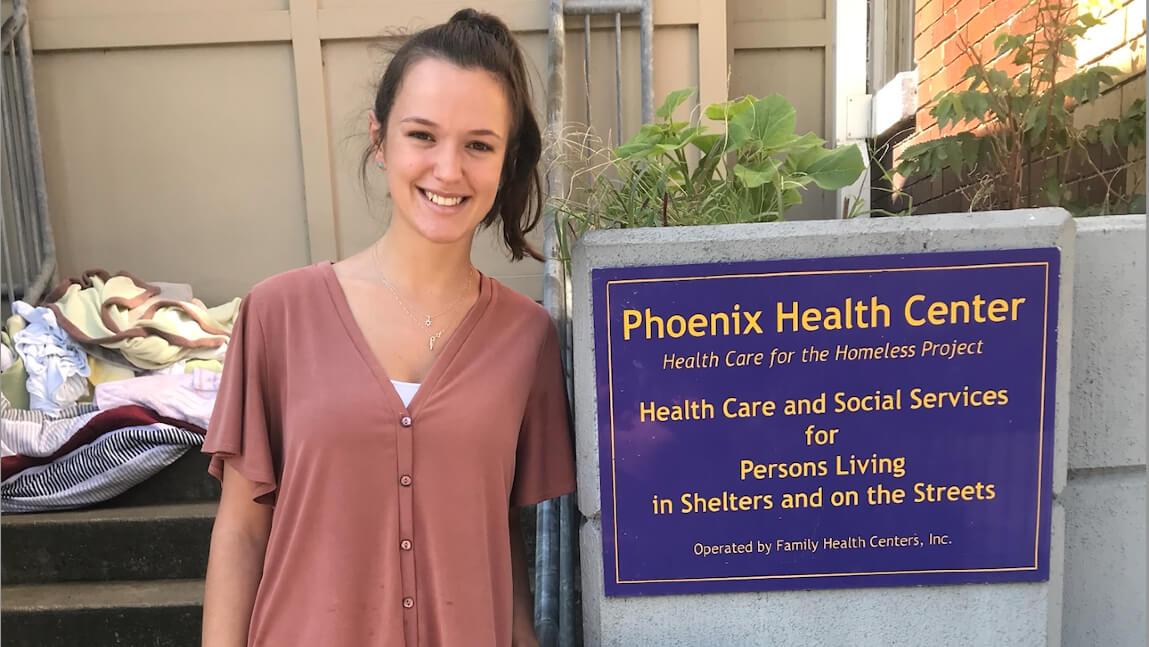The latest U.S. Census bureau statistics show that 40 million Americans, over 12% of the population, live in poverty. It’s a stark statistic but it doesn’t go very far to describe the many dimensions—economic, social, health and educational—of the problem.
Since 2015 about 3-5 University of Vermont students each year explore poverty in depth through the university’s participation in the Shepherd Higher Education Consortium on Poverty (SHECP) in the College of Education and Social Services (CESS).
UVM is among a select group of colleges and universities that offer eight-week SHECP summer internships at partner agencies across the U.S. The goal is to give meaningful civic engagement opportunities to students who are committed to the fight against poverty.
“We really want students to think about what it means to have an impact on people in poverty that honors their human dignity and their life experience,” said Tiffanie Spencer, director for Diversity and Community Engagement in CESS and the internship coordinator for SHECP.
SHECP Internships are available to UVM students at no cost. All expenses related to the internship experience are covered, including travel, housing and a living stipend. At the same time, the stipend is modest for intentional reasons.
“One of the goals of the program is to have students reflect on what it means to live on a limited income –what that experience might look like in real life,” Spencer says.
The Shepard Foundation places intern cohorts in a particular city or region of the country. The “day jobs” at the agencies where interns serve may be very different, but students live together in communal housing or in close proximity to each other. They learn to pool their resources, make communal purchasing decisions and collaborate on shopping trips.
The living arrangement gives students plenty of opportunities to share perspectives as well as communal meals.
“One student might be interning at a food pantry. Another might work at an agency serving victims of domestic violence, or work at a law firm,” Spencer explains. “So they are all going to bring different perspectives on life experiences faced by people living in poverty in different environmental circumstances..”
This makes SHECP a truly interdisciplinary experience, she says. Students with majors as diverse as economics, political science, nutritional science, public health or social work all bring something to the table.
When advising students about SHECP opportunities around the country, Spencer also encourages them to venture out of their comfort zone. Students who grow up in a city may have encountered the face of poverty in an urban setting. That visage may look very different in rural America.
In the field
Anthropology major Ashlynn Ruleman ’21 moved a lot as a kid—her father is in the military and her family lived in mostly suburban or rural areas. Her internship was based in Camden, N.J., through the Camden Coalition of Health Care Providers, part of the non-profit National Center for Complex Health and Social Needs.
“It wasn’t the typical internship experience because of COVID,” she said. “But even working remotely, the conversations I had with the population the Coalition served, I was able to visualize the systemic inequities that propagate health inequities in the city.”
Ruleman administered a risk assessment questionnaire to patients recently admitted to local emergency rooms. If patients didn’t meet qualifications for financial assistance—perhaps their income level was higher than the allowed threshold—she would try to connect them with agencies like food shelves that could fill in some of the gaps.
“Sixty percent of ER visits were things that could have been mitigated by a primary care physician,” she said. “But the patient might not have reliable transportation, or be able to get time off from work. Maybe they didn’t have a PCP network near their home or workplace.”
SHECP intern Maeve Lyons ‘21, a health science major with a minor in Spanish, spent the summer of 2019 in Louisville, Ky., working with the Family Health Center Phoenix, an organization that assists the homeless population. She joined assessment teams at the agency that ventured out to talk with homeless people in the shelters and on the streets.
“People ended up homeless for a lot of reasons,” Lyons said. “One person I spoke to had just come out of prison. Many young people were trying to escape the foster care system. Some were Latin American immigrants just trying to escape their situation and hoping to secure a better future.”
Lyons administered a survey, the answers to which ranked each person on a scale of vulnerability. People especially at risk might qualify for a local housing program, but long wait times were inevitable given the shortage of housing in Louisville.
Some potential clients expressed frustration. “Many of them said they had taken the survey months earlier and still hadn’t heard anything,” Lyons said. Others were deeply grateful that someone cared about their circumstances.
A big takeaway for Lyons was the dedication and compassion of agency workers.
“It was definitely eye-opening to see how challenging and multifaceted the homeless problem is, and the stamina it takes to do this kind or work.”
While the daily lessons could be intense and sometimes discouraging, Ruleman and Lyons never felt unsupported. Weekly online sessions with Spencer and on-site supervisors gave them opportunities to debrief. Because they moved through the experience with fellow interns from other institutions, they had opportunities compare notes and hash out the highs and lows.
Spencer says the SHECP curriculum in intentionally structure to help guide each intern thorough the process of poverty and their own personal growth.
“We ask students to think critically about the work they are doing in how it impacts them personally as well as those they are working alongside in the context of localized and systemic structures,” Spencer said.
